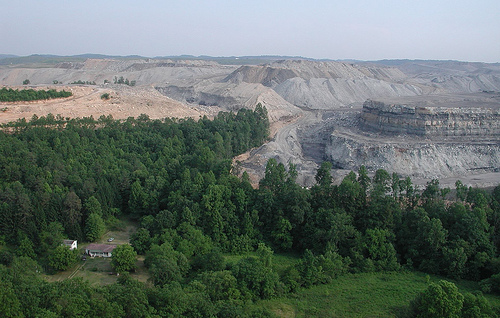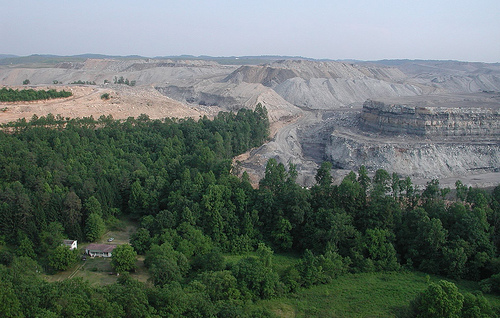 The Obama administration on Thursday announced new steps to reduce the environmental damage from mountaintop-removal (MTR) mining, a controversial and highly destructive practice used to extract coal from Appalachia. Activists from the region and the environmental community say that’s a nice first step, but they’re disappointed that the admin isn’t planning to rein the practice in further and ultimately put a stop to it.
The Obama administration on Thursday announced new steps to reduce the environmental damage from mountaintop-removal (MTR) mining, a controversial and highly destructive practice used to extract coal from Appalachia. Activists from the region and the environmental community say that’s a nice first step, but they’re disappointed that the admin isn’t planning to rein the practice in further and ultimately put a stop to it.
The government will end fast-tracked reviews for MTR operation permits, require tougher environmental review before permits are issued, and reassert federal oversight for state regulators that grant permits. The administration said it will also tighten the loopholes that currently allow companies to dump coal waste near streams, restoring a 100-foot buffer zone rule that the Bush administration removed shortly before leaving office.
“The Obama administration has serious concerns about the impacts of mountaintop removal on natural resources and the health and welfare of the communities of Appalachia,” said Nancy Sutley, head of the White House Council on Environmental Quality, in a call with reporters. The plans announced on Thursday will “ensure future mining projects are more responsible,” she said.
But Sutley said the administration has not decided whether to move toward ending MTR outright. Mountaintop removal is “a practice we believe has serious environmental impacts,” she said. “However, it is a practice allowed by law … Until that changes, we have to use the tools that we have.”
EPA Senior Policy Counsel Bob Sussman also emphasized that the administration will be acting within current law. “Our job under the Clean Water Act … is to make sure that these projects do not result in significant degradation of water quality.”
That’s it?
Activists working to end MTR say that’s not good enough.
“While we’re certainly happy to hear government agencies say they’re going to enforce the law … those regulations have been so severely weakened by the Bush administration that it’s doing no good for the communities in Appalachia and for the water quality of the southeastern United States,” said Stephanie Pistello, a legislative associate for the Alliance for Appalachia and Appalachian Voices.
Pistello pointed out that the administration recently okayed 42 of 48 MTR permits. “Enforcing the law has already allowed for 42 permits to be approved since March of this year,” she continued. “That should raise red flags … Clearly the law is not sufficient for the protection of the people and environment of Appalachia.”
Rainforest Action Network agrees: “Rigorous enforcement of existing laws is of course needed and would be a welcome change, but does not in itself represent the true change that we need to transition immediately away from the destructive practice of mountaintop removal.”
Anti-MTR groups want to see the Obama administration restore language preventing the dumping of mine waste into waterways, reversing a change to the law that the Bush administration made shortly after taking office. The Bush administration in 2002 altered Clean Water Act rules to make it legal to fill valleys with waste from blast sites, which led to significantly increased use of MTR.
“[T]he only way to end the devastation in Appalachia is to quickly reverse the Bush administration’s rule making it legal to fill streams with mining waste,” said Sierra Club Executive Director Carl Pope in a statement. “The true test of these new policies and of President Obama’s legacy on this issue will be whether they change the terrible situation on the ground in Appalachia.”
Read more:
- Sierra Club launches new campaign and website to fight MTR
- Activist and writer Jeff Biggers says the Obama team’s efforts fall far short
- Reactions from coalfield activists and residents



